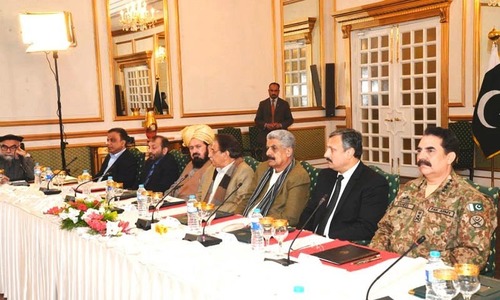How long will govt use military as a crutch, asks PTI's Shah Mehmood Qureshi
Pakistan Tehreek-i-Insaf (PTI) senior leader Shah Mehmood Qureshi on Tuesday said the government was using the military as a crutch.
"Operation Zarb-i-Azb was successful but how long will the government use the military as a crutch?" he asked.
Qureshi was speaking to journalists after a meeting of the opposition leaders with National Assembly Speaker Ayaz Sadiq on the government's decision to revive the controversial military courts.
The meeting between opposition parties' representatives and the speaker took place a day after the federal government initiated consultations to introduce a constitutional amendment reinstating the controversial courts for a period of time all political parties agree upon.
Qureshi told the media that during the meeting all parties representatives had agreed to consult with their party leaders on the government's stance.
Qureshi added that the government had not succeeded in convincing its allies, Pukhtunkhwa Milli Awami Party (PkMAP) and Jamiat-i-Ulema-i-Islam Fazl (JUI-F), to support the revival of the courts.
"Even the first time, support was offered on a conditional basis," he said.
Qureshi told the press that the Khyber Pakhtunkhwa government does not support the reinstatement of military courts.
Earlier in the day, opposition leader Khursheed Shah had chaired a consultative meeting of opposition parties regarding the revival of military courts, and said the PPP will oppose the reinstatement of military courts.
The consultative meeting was attended by Qureshi and PTI's chief whip in the National Assembly, Shireen Mazari, as well as PPP's Naveed Qamar, and Jamaat-i-Islami's Tariqullah.
Speaking to journalists about the PPP's stance on the revival of military courts after the consultative meeting, Shah said, "This has been our point of view since day one."
The JI declared that they, too, would oppose the reinstatement of military courts.
PTI's Qureshi said the PTI would first listen to the government's point of view on the subject and then present its own.
Pakistan had legalised military court trials of terror suspects for a period of two years in January 2015 — soon after the terror attack on Peshawar's Army Public School in Dec 2014, in which 144 people, most of them children, were killed by Tehreek-i-Taliban Pakistan militants.
The two houses of parliament had on that occasion voted unanimously for the legislation despite fears among lawmakers that the tribunals they were authorising would not be able to ensure due process to the suspects and might undermine democracy.
An All Parties Conference (APC) gave the green light for the amendments to the Pakistan Army Act to extend its jurisdiction for speedy trial of cases under specified acts and provide the constitutional cover with a sunset clause of two years from the date of enactment.
At first the 21st Amendment, as it is popularly known, was met with much debate, but over time, military courts wove themselves into the fabric of Pakistan’s criminal justice system.
The controversial special powers empower military courts to try civilian terror suspects along with affording these proposed tribunals constitutional protection.
Military courts do not grant convicts the essential components of a fair and free trial, as they lack in transparency and do not allow convicts the option to appeal to civilian courts.
In its editorials, Dawn has criticised the establishment of military courts for "simply not being compatible with a constitutional democracy."
Editorial: Military courts













































